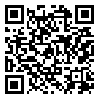BibTeX | RIS | EndNote | Medlars | ProCite | Reference Manager | RefWorks
Send citation to:
URL: http://irancounseling.ir/journal/article-1-479-en.html
The main objective of this study was to investigate the relationship between attachment styles and marital commitment in people who have committed adultery in the marital relationship. Methods: This study was correlational. The study population included all individuals who commit disloyalty to have been married in the spring of 95 were referred to counseling centers in Tehran, where 428 people were selected using a hand. To collect the data, Hazan and Shaver adult attachment style and marital commitment Adams and Jones were used. The data correlation and regression analysis using software PLS-3 been done. Results: The results revealed that attachment styles can commit 13% of unfaithful people predict changes . Regression analysis anxious attachment style (01 / 0p≤) and regression coefficient avoidant attachment style (05 / 0p≤) on marital commitment is significant. Secure attachment style was not significant, but the regression coefficient. Since marriage and choice of spouse is living one of the most important decisions with regard to the role of insecure attachment styles predict the anxiety and avoidance, should be The identification of these two variables in pre-marriage counseling as well as training parents on child education and stressed that attachment styles.
Received: 2016/11/18 | Accepted: 2017/02/25 | Published: 2017/03/18
| Rights and permissions | |
 |
This work is licensed under a Creative Commons Attribution-NonCommercial 4.0 International License. |




